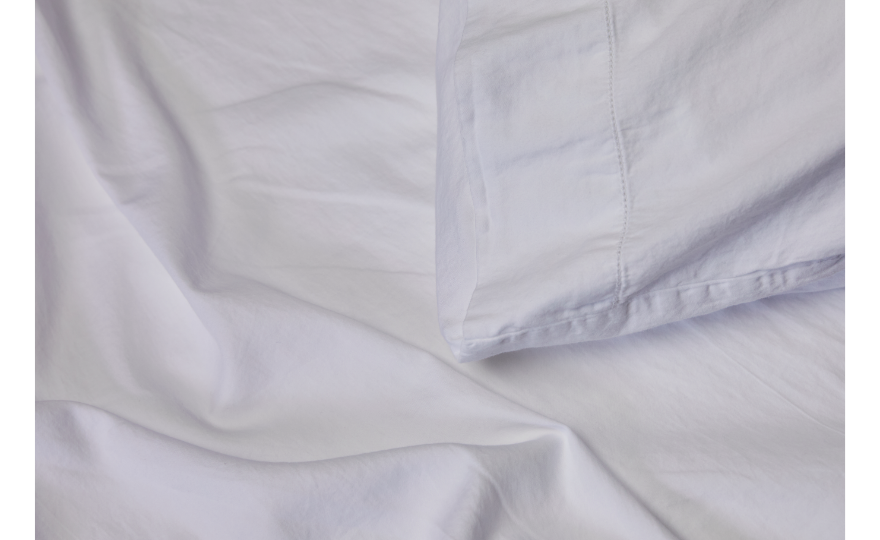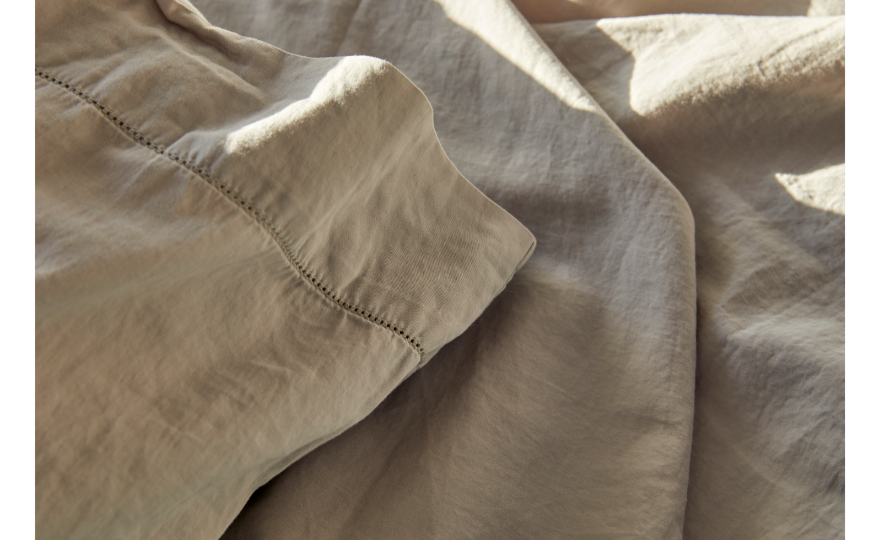365-DAY GUARANTEE | FREE SHIPPING | FREE RETURNS
365-DAY GUARANTEE | FREE SHIPPING | FREE RETURNS
365-DAY GUARANTEE | FREE SHIPPING | FREE RETURNS
Your Cart is Empty
When you shop for new bed sheets, you might feel overwhelmed by all the choices available. One such dilemma is deciding between microfiber vs cotton sheets. While both of these materials are quite popular and affordable, there’s a distinct difference between the two. Both cotton and microfiber sheets are viable choices, but it’s important to know the truth about key factors like softness, the possible health implications of using microfiber sheets, and the pros and cons of each. Our guide will explore the difference between these two materials, so you can decide which one will provide you with the utmost comfort for better sleep. Read on to learn more about microfiber vs cotton sheets: discovering the sheets that let you breathe easily.
When debating between microfiber sheets vs cotton, there are a few key characteristics of each one that you should keep in mind. Let’s compare and contrast the performance, features, and perks of both of these bedding materials.




Perhaps one of the biggest debates between cotton vs microfiber sheets is which one is softer. What material is microfiber? This fabric consists of a thin material that is often synthetic, making these sheets less prone to wrinkling. What are microfiber sheets made of? Most of these sheets are made of a blend of materials including polyester, wood pulp, and nylon polymers. The lightweight nature of microfiber gives it a slightly smooth and slippery feel, which adds to its overall softness. But is microfiber cotton? Because it’s made of synthetic fibers, some people can tell the difference between microfiber and cotton in terms of natural softness against the skin. These sheets are typically found in either a percale or sateen weave.
Cotton sheets are made from cotton plants, so they’re automatically soft by nature. These sheets come in a wide variety of styles, blends, and weaves depending on what type of cotton is used and how they’re manufactured. One perk to this material is that cotton sheets tend to get softer with frequent washing. Pima cotton is one of the softest choices, while upland cotton is a more affordable choice if you’re on a budget, and it’s the most common type found in mass-produced cotton sheets. When it comes to microfiber vs cotton bed sheets, microfiber sheets tend to have a more slippery feel, cotton fibers are much softer and more pliable.

Many conscious consumers are curious about the health implications of using microfiber fabric sheets. Certain materials may not only affect your health but also your sleep quality as a whole. People with sensitive skin may find that the synthetic fabric of microfiber can cause symptoms to become worse over time. Is microfiber breathable, and do microfiber sheets make you sweat? Most microfiber sheets tend to trap heat, so hot sleepers or people dealing with night sweats may find them unpleasant when compared to more breathable materials like cotton fabric. When comparing microfiber vs polyester sheets, microfiber may be slightly better if it’s blended with cotton.
Cotton is naturally breathable and also has moisture wicking properties that draw sweat away from the body to keep you comfortable and cool during the night. And since the cotton plant produces a natural fiber, there are fewer chemicals and additives used to make cotton bedding. Organic cotton sheets are free of any extra chemicals you probably can’t pronounce, so they’re much safer for people with allergies and sensitive skin. They also don’t trap body heat like microfiber tends to do. This makes them a better choice for not just more comfortable sleep but for better quality sleep overall.
There are lots of microfiber sheets pros and cons, so it’s important to know about some of the disadvantages of this material:

Breathable sheets promote better comfort and a good night’s sleep. Are microfiber sheets cool and are microfiber sheets breathable? The truth is that organic cotton sheets are naturally breathable, and therefore are much better at regulating your body temperature than microfiber. Stonewashed linen is another exceptionally comfortable and breathable choice. Not only is linen eco-friendly, but it’s also extremely long-lasting. If you tend to get hot during the night, it’s recommended that you choose sheets that are not just soft to the touch, but also as breathable as possible to help you stay cool. Look for sheets with a lower thread count, as those with higher thread counts per square inch won’t allow for good airflow.
Do microfiber sheets make you sweat? If you have your heart set on buying microfiber sheets, choose a set designed with a loose weave. Some microfiber sheet sets are mixed with other breathable fibers to help promote better breathability. Make sure you select microfiber sheets based on the weave. Instead of thread count, this material is measured in grams per square meter, or GSM, to determine its thickness. It’s also important to take your nighttime body temperature and your personal preferences into account to help you stay as comfortable as possible. Natural materials (like organic cotton, linen, etc.) always tend to breathe better than synthetic ones, so it’s important to keep that in mind as you decide which material is the right one for you.
Buying new sheets is an important investment not just in your home, but also for your lifestyle, which is why durability is so important. Cotton and microfiber sheets are both generally durable, and both tend to last about two to three years with proper care. However, the thin fibers of most microfiber materials make them more susceptible to tearing over time. These fibers are thinner than silk, so these sheets should be treated with the utmost care. However, the tight weave of microfiber can help make it last a bit longer a bit than cotton as long as you follow the correct care instructions. It can withstand frequent washing fairly well, which gives it a good lifespan.
Here are some tips to help you maintain and prolong the lifespan of your microfiber sheets:
Is microfiber good for sheets? Microfiber and cotton sheets are both good choices for your bed, but cotton wins the day in terms of sustainability, softness, and healthy quality of sleep. Think about various factors, including choosing sheets with a higher thread count for more durability, or some with lower thread counts if you’re more concerned about keeping cool. Always consider your personal preferences in terms of comfort, maintenance, and the potential health concerns associated with certain materials when you’re selecting a new set of sheets. Both microfiber and cotton have their fair share of perks, but the high-quality bedding products at Or & Zon are made from 100 percent organic materials that will not only keep you healthy but will also keep the planet healthy, too. Explore our current collection of bedding to find the ultimate option for your sleeping space today.
